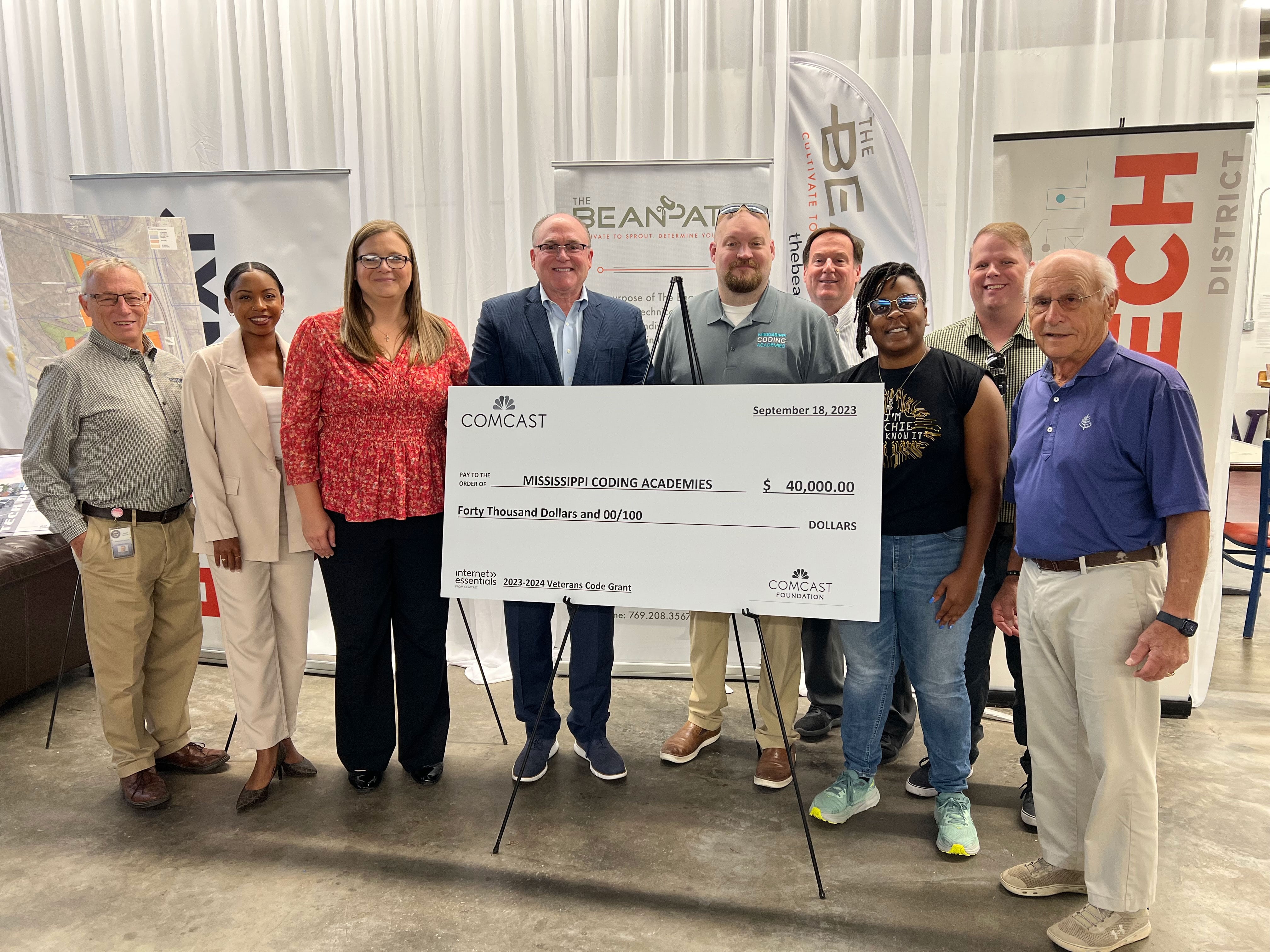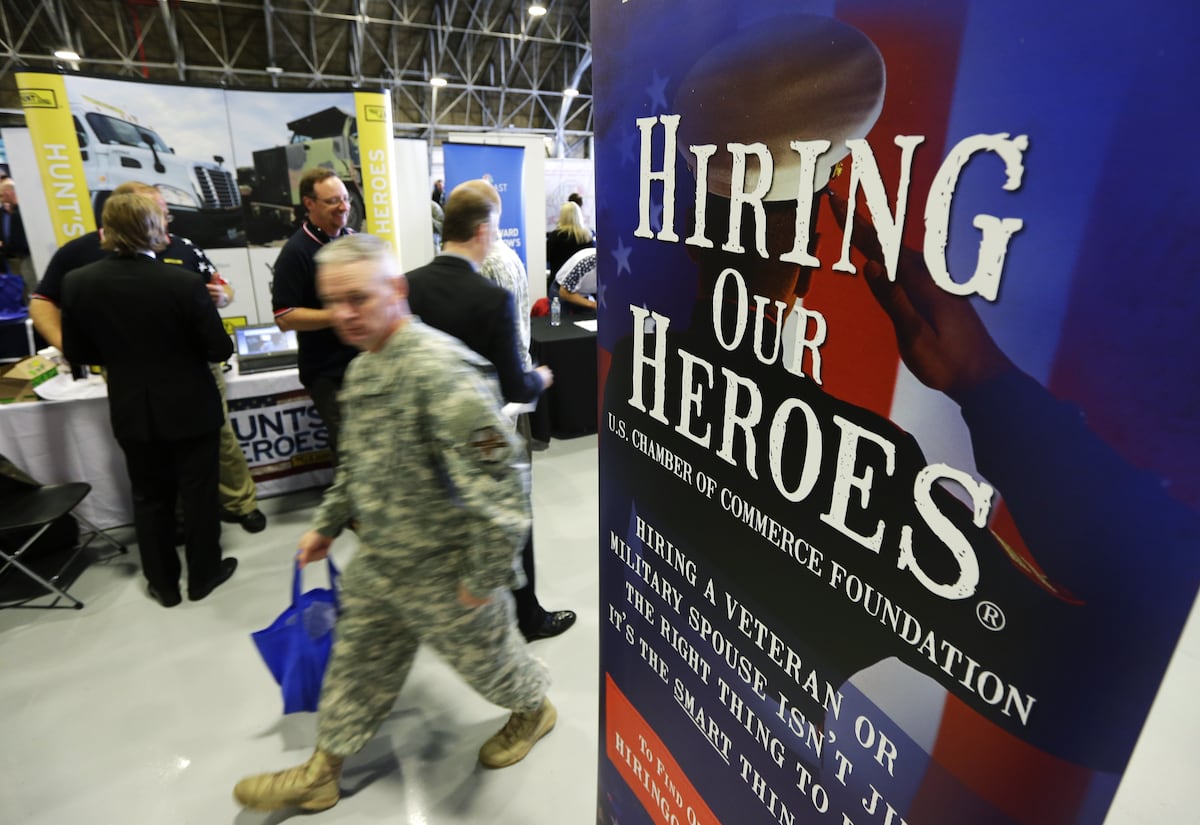Recruiting veterans and military family members to work at Booz Allen Hamilton means reaching them wherever they are, even if they’re living across an ocean.
“You’ve got transitioning vets and spouses that are in Stuttgart, Germany, or Okinawa, Japan, or any other place where the government puts them for their military time, and they’ll transition from overseas and come back home to what?” said Tom Downs, director of diversity talent acquisition and talent pipeline programs at Booz Allen Hamilton.
“So, post pandemic, we still have a robust virtual program, so we can talk to every veteran, every spouse across the U.S. or the globe for that matter. … We can’t hire every one of them, but we can make sure to at least have a conversation with them.”
That focus on attracting military talent is no small matter for the technology firm: About one-third of its annual hires are veterans, reservists or military dependents. Downs said the company has five recruiters dedicated solely to military recruitment, a reflection of the importance the population carries for the company.
The aggressive hiring strategy — and a host of other military-centric employee programs — earned Booz Allen Hamilton the top spot on the 2024 Military Times Best for Vets Employers rankings.
The company has been a regular among the top names in the annual Best for Vets list in past years, in large part because of its commitment to including veterans as core workers.
The survey weighs how organizations recruit, mentor and retain veterans and their family members. Hilary Niles, survey coordinator for the Best for Vets list, said the rankings don’t just echo companies’ raw staffing numbers, but also include factors such as “support programs, accommodations for military connected employees with disabilities, and opportunities for spouses and caregivers.”
This year’s list includes 238 employers spread across 44 states, with 62 firms making their debut in the rankings.
It includes 33 defense contracting firms — traditionally seen as military-friendly and military-heavy companies — but also companies in fields less associated with hiring veterans, like health care, hospitality, energy and banking.
The top 10 includes representatives from nine different industries, with only pharmaceutical employers appearing twice (Johnson & Johnson at #2, and Bristol Myers Squibb at #6).
Employee feedback
Comcast NBCUniversal, the #3 company on the Best For Vets list, earned its spot not just because of its veterans hiring patterns but also because of consistent communication with those employees throughout their careers.
Several years ago, when veterans working there pitched the idea of a discount for military families on their cable services, officials at the company fast-tracked the proposal and sent notices to military bases.
When another veteran at the media firm replaced a tattered American flag visible in his neighborhood with his own money, officials set aside thousands more to replace any aging flags that employees see in the community.
“We want to serve military customers, but we can’t do that authentically if we don’t have military-connected employees in our own workforce who can advise and guide us,” said Mona Dexter, vice president of military and veteran affairs at the company. “And seeing that response encourages our employees.”
The flag program — dubbed Operation Old Glory — is less about directly helping veterans at the company and more about finding ways to link their patriotism and service to their post-military lives.
“It’s that continued sense of service and connection to the symbol that represents the country,” she said. “And it’s a bit of education — not just for our employees, but for community members, too.”
Most companies near the top of the rankings boast relationships with local veterans groups and military advocacy organizations to emphasize that community connection.
One of Booz Allen Hamilton’s most successful partnerships is with the Defense Department, through their Skillbridge Program for transitioning troops.
The initiative allows service members — and now, some military spouses — an opportunity for professional internships and apprenticeships at private-sector firms during their final six months in service. The goal is to give transitioning service members a chance to better understand the private sector and showcase their skills, with an eye towards a post-military career.
Downs said Booz Allen Hamilton’s involvement in the program has grown from around 20 participants five years ago to more than 150 this year. More than 90% of individuals enrolled in Skillbridge partnerships have gone on to land jobs at the company after completion.
“That’s really the crown jewel right now,” he said. “If other companies aren’t engaging with that, I don’t know why not.”

Community connections
Downs noted that veterans also contribute to the overall diversity of Booz Allen Hamilton’s workforce by bringing their own unique experiences to the company. The firm boasts 11 different “employee communities” to highlight the backgrounds of various groups, including one for military-connected individuals.
“They each have their own networking events, their own development programs,” he said. “And you can be a member in as many of the groups as you want. They do happy hours, they do fun runs. That’s the kind of stuff that keeps people here, feeling connected to the community.”
It’s also another tool for recruiting. Downs said when military-related recruits start with the company, they’ve typically already communicated with other veterans at the firm, learning about available support networks and mentoring opportunities.
Nearly two-thirds of the companies on this year’s Best For Vets list said they have an active employee group focused on veterans or related community members, helping to sustain a military-friendly atmosphere at work.
About the same percentage said they have military-specific mentorship programs available to eligible employees.
Dexter said officials at Comcast NBCUniversal have noticed their employee support groups increasingly working together on charity and networking projects, bringing their specific communities together in ways that build more camaraderie.
“Nobody in the veteran employee resource group identifies only as a veteran,” she said. “Everybody can identify with multiple other communities, too. … So, by bringing the various groups together, it just shows how there really is just a place for everyone, and everybody belongs.”
Leo covers Congress, Veterans Affairs and the White House for Military Times. He has covered Washington, D.C. since 2004, focusing on military personnel and veterans policies. His work has earned numerous honors, including a 2009 Polk award, a 2010 National Headliner Award, the IAVA Leadership in Journalism award and the VFW News Media award.
Read the full article here
